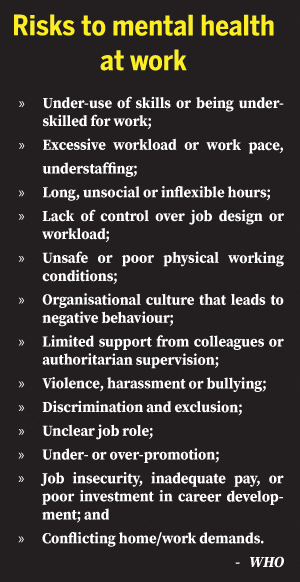The stark truth is that any of us could experience mental illness or a mental imbalance at any stage of our lives. It is purely natural. When you feel that you are not behaving normally or notice a change in a family member’s or colleague’s behaviour, it’s time to seek help. This help could be as simple as confiding in a loyal friend or when necessary turning to professional care for a while.

Chairperson of Sri Lanka Sumithrayo, Suranjani Wickremaratne
As the World Health Organization (WHO) states, mental health is more than the absence of mental health conditions. It is a state of mental well-being that enables individuals to cope with the stresses of life, realise their abilities, learn effectively, work productively and contribute to their communities.
World Mental Health Day was celebrated on October 10 under the theme ‘It is time to Prioritize Mental Health in the Workplace.’ The post-Covid-19 world has reshaped how we work. Some employees have transitioned to full-time remote work, while others continue the daily grind in office. Regardless of the setting, everyone operates under their superiors, following the structures in place. The need for mental well-being within this framework has never been more pressing.
Mental Health at Work
Decent work is essential for good mental health, as poor working environments—including discrimination, inequality, excessive workload, low job control and job insecurity—pose significant risks to mental well-being.
According to the WHO, in 2019, “An estimated 15 percent of working-age adults were reported to have a mental disorder. Globally, approximately 12 billion working days are lost each year due to depression and anxiety, resulting in a staggering cost of $1 trillion in lost productivity. However, effective measures exist to prevent mental health risks at work, protect and promote mental health and support workers facing mental health conditions.”
The United Nations System Mental Health and Well-being Strategy for 2024 and beyond, aims to foster a positive mental health environment and ensure support whenever required. It focuses on preventing risks to mental health at work, promoting well-being and protecting mental health and supporting personnel with mental health conditions.
Tackling mental health issues in Sri Lanka
 In response to a query from the Sunday Observer on what leads to workplace stress, Chairperson of Sri Lanka Sumithrayo, Suranjani Wickremaratne drawing from her experience during corporate sessions, explained that one key factor contributing to stress is the significant migration of the workforce overseas. As a result, many organisations struggle to recruit new staff, leaving existing employees with increased workloads, responsibilities and tight deadlines, leading to considerable work pressure.
In response to a query from the Sunday Observer on what leads to workplace stress, Chairperson of Sri Lanka Sumithrayo, Suranjani Wickremaratne drawing from her experience during corporate sessions, explained that one key factor contributing to stress is the significant migration of the workforce overseas. As a result, many organisations struggle to recruit new staff, leaving existing employees with increased workloads, responsibilities and tight deadlines, leading to considerable work pressure.
The other key factors were financial and marital issues (especially among young couples), she said.
“Financial issues also contribute to stress. In our country, we have had an economic crisis and many employees find that their salaries do not support their expenses. Balancing home responsibilities with financial pressure is another significant source of stress. Marital issues, including extramarital relationships by either spouse, are also common problems that lead people to seek help from Sri Lanka Sumithrayo,” she said.
Speaking about the type of help they offer, Wickremaratne said, Sri Lanka Sumithrayo does not send anyone for medical treatment immediately. “We have a chat with the individual to determine whether the issue can be addressed through befriending. However, if we feel the person may need medication, we advise them to consult a doctor. In cases of prolonged depression, we encourage the individual to seek medical attention for appropriate treatment,” she said.
Early signs of mental health issues that employees, colleagues, and family members should look out for are gradual changes in normal behaviour.
Wickramaratne said if something is troubling them, they might lose their appetite, may not be able to sleep and there may also be mood swings. Family members may notice the person being inattentive, always being in a thoughtful mood, just sitting idly and not doing anything.
“Someone who was previously active may become slightly inactive. If these signs continue, it’s important to help the person come out of it. If left unaddressed it can affect the person’s entire system and prolonged depression may require medication,” she said.
Confide
What is most needed is a person in whom they can confide. She emphasised the importance of sharing mental struggles with a close and trustworthy person, particularly a friend, family member or someone the affected person deeply trusts.
“This is where Sri Lanka Sumithrayo comes in. We always say that whatever is shared with us is fully confidential,” she said.
Sometimes, when you unburden yourself, it helps and provides relief. When you’re facing a problem, it often leads to tunnel vision; you tend to fixate on your thoughts, which can be overwhelming. However, once you begin speaking to someone, that person can help you return to a normal state and present the available options as to what you can do, she said.
The Chairperson emphasised that what is done at Sri Lanka Sumithrayo is a strengthening process. “We strengthen the individual to help them make their own decisions. We don’t make decisions for anyone; rather, we guide them to arrive at the decision they want. However, if we see that the person needs medication, we will definitely refer them to a doctor.” she said.
Marked rise in cases
She said there has been a massive rise in mental health issues post-Covid-19. “Our entire lifestyle changed as the pandemic really took a toll and soon after we faced a financial crisis in Sri Lanka,” Wickremaratne said last year alone, they received over 12,000 cases that required counselling.
It is often said that for every suicide, there are approximately 20 attempts.
“Many people who experience stress, depression or other mental health issues come to us and we witness numerous cases firsthand. While suicide statistics may show a certain number of deaths each year, it’s important to recognise that for every suicide, there are approximately 20 attempts. This highlights the gravity of the issue.” she cautioned.
Work-life balance
When asked how people can balance high job demands with self-care, she said that work-life balance was extremely important.
Individuals need to dedicate at least a couple of hours each day to activities that nurture them, such as exercising, meditating, reading a book or simply taking time off. Even during weekends, it’s essential to spend time alone or engage in activities that promote relaxation.
This self-care helps recuperate from the pressure and demand of work. It’s crucial to carve out at least one hour each day for personal time—whether it’s going for a walk or enjoying a hobby. Working long hours, from seven in the morning until ten at night can lead to burnout, so it’s important not to bring work home. Connecting with a friend who can make you laugh and help you relax is also vital. Taking time for oneself is essential to maintain overall well-being, she said
Supervisor’s responsibility
The Chairperson also said it is the responsibility of employers and immediate supervisors not to overload staff with work. While she acknowledged that there may be staff shortage and work overload may be temporary until a deadline is met, it is still crucial to consider the well-being of employees.
If someone feels overloaded, he/she needs to have a one-on-one conversation with the boss to explain the pressure they are experiencing. This discussion allows the boss to understand the individual’s situation better. If, for instance, the employee is finding it difficult to cope, they should consider exploring alternatives, Wickramaratne said.

If the workload is temporary, the individual can reassure themselves that the situation will improve after a month or so. “’You have to remind yourself that it’s only for one month. You have to tell yourself that you will get through this period and find your way back on track,” the Chairperson said.
She reiterated, however, that regardless of the situation, it is important for employees to spend time doing things they enjoy.
Stigma
In countries such as Sri Lanka, unnecessary fear and stigma surrounding mental health issues often prevent people from seeking treatment. It’s important to remember that, like any other illness, mental health challenges are a normal part of life. Many cases of mental imbalance can be effectively addressed by simply listening to the person. What they need most is an attentive ear.
“In our corporate awareness programs, we encourage people to seek help and emphasise that there is no shame in doing so. We all face challenges and it’s important to reach out and talk to someone who can offer support,” she said.
Wickremartne wished everyone peace and mental clarity. “We need to build a community which is strong in their vulnerabilities. So we need to prioritise mental wellness today and every day. We need to invest our time and energy into achieving a work-life balance.
“If you encounter any issues, it’s essential to seek help instead of doing nothing about it. It’s equally important to reach out to others if you see them struggling with mental issues,” and added “We all face vulnerabilities, but ultimately how we handle them is what truly matters. Most importantly, remember that you are not alone”, she said.
If you need support, call Sumithrayo on 0707 308 308 or any other number available on Sri Lanka Sumithrayo website. https://srilankasumithrayo.lk/.




